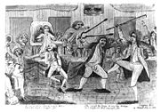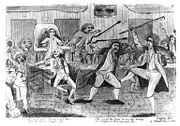
Roger Griswold
Encyclopedia
Roger Griswold was the 22nd Governor of Connecticut
and a member of the US House of Representatives, serving as a Federalist
.
Born in Lyme
, New London County, Connecticut
, to Matthew Griswold
and Ursula (Wolcott) Griswold; pursued classical studies, and was graduated from Yale College
in 1780; studied law; was admitted to the bar in 1783 and commenced practice in Norwich, Connecticut
; returned to Lyme in 1794; elected as a Federalist
to the Fourth and to the five succeeding Congresses and served from March 4, 1795, until his resignation in 1805 before the convening of the Ninth Congress; chairman of the Committee on Revisal and Unfinished Business (Sixth Congress), Committee on Ways and Means
(Sixth Congress); declined the portfolio of Secretary of War
tendered by President John Adams
in 1801; served as a judge of the supreme court of Connecticut in 1807; presidential elector on the Charles Cotesworth Pinckney
and Rufus King
ticket; Lieutenant Governor of Connecticut 1809-1811; Governor of Connecticut from 1811 until his death in Norwich; interment in Griswold Cemetery at Black Hall, in the town of Lyme (now Old Lyme, Connecticut
).
Griswold was grandfather of congressman Matthew Griswold
. Griswold's father (Matthew Griswold), his maternal grandfather (Roger Wolcott
), his uncle (Oliver Wolcott), and his cousin (Oliver Wolcott, Jr.
) were all also Governors of Connecticut.
 Before the fighting started, the date, January 30, 1798 was planned to remove William Blount
Before the fighting started, the date, January 30, 1798 was planned to remove William Blount
, from office, in Tennessee
. Lyon was ignoring Griswald, on purpose, because they were opposite parties, Lyon was a Democratic-Republican and Griswald was a Federalist, causing Griswold to call Lyon a scoundrel, then Lyon spat in Griswold's face, after hearing he was called a scoundrel, by Griswold, then their their brawl immediately started.
Griswold was the first congressman to engage in a physical altercation with another congressman. Matthew Lyon
, a Democratic-Republican congressman from Vermont, was insulted by Griswold on the floor, and proceeded to spit on him. Two weeks later, Griswold attacked him with a cane. Lyon promptly picked up a pair of fire tongs to ward him off.
In 1803 along with several other New England Federalist politicians he proposed secession from the union due to the growing
influence of Jeffersonian Democrats and the Louisiana Purchase which they felt would dilute Northern influence.
Connecticut
Connecticut is a state in the New England region of the northeastern United States. It is bordered by Rhode Island to the east, Massachusetts to the north, and the state of New York to the west and the south .Connecticut is named for the Connecticut River, the major U.S. river that approximately...
and a member of the US House of Representatives, serving as a Federalist
Federalist Party (United States)
The Federalist Party was the first American political party, from the early 1790s to 1816, the era of the First Party System, with remnants lasting into the 1820s. The Federalists controlled the federal government until 1801...
.
Born in Lyme
Lyme, Connecticut
Lyme is a town in New London County, Connecticut, United States. The population was 2,016 at the 2000 census. Lyme and its neighboring town Old Lyme are the namesake for Lyme disease.-Geography:...
, New London County, Connecticut
New London County, Connecticut
New London County is a county located in the southeastern corner of the U.S. state of Connecticut. As of 2010 the population was 274,055. The total area of the county is , including inland and coastal waters....
, to Matthew Griswold
Matthew Griswold (governor)
Matthew Griswold was the 2nd Governor of Connecticut from 1784 to 1786. He also served as Lieutenant Governor and Chief Justice of the Superior Court, during the American Revolution .-Early life:...
and Ursula (Wolcott) Griswold; pursued classical studies, and was graduated from Yale College
Yale College
Yale College was the official name of Yale University from 1718 to 1887. The name now refers to the undergraduate part of the university. Each undergraduate student is assigned to one of 12 residential colleges.-Residential colleges:...
in 1780; studied law; was admitted to the bar in 1783 and commenced practice in Norwich, Connecticut
Norwich, Connecticut
Regular steamship service between New York and Boston helped Norwich to prosper as a shipping center through the early part of the 20th century. During the Civil War, Norwich once again rallied and saw the growth of its textile, armaments, and specialty item manufacturing...
; returned to Lyme in 1794; elected as a Federalist
Federalist Party (United States)
The Federalist Party was the first American political party, from the early 1790s to 1816, the era of the First Party System, with remnants lasting into the 1820s. The Federalists controlled the federal government until 1801...
to the Fourth and to the five succeeding Congresses and served from March 4, 1795, until his resignation in 1805 before the convening of the Ninth Congress; chairman of the Committee on Revisal and Unfinished Business (Sixth Congress), Committee on Ways and Means
United States House Committee on Ways and Means
The Committee of Ways and Means is the chief tax-writing committee of the United States House of Representatives. Members of the Ways and Means Committee are not allowed to serve on any other House Committees unless they apply for a waiver from their party's congressional leadership...
(Sixth Congress); declined the portfolio of Secretary of War
United States Secretary of War
The Secretary of War was a member of the United States President's Cabinet, beginning with George Washington's administration. A similar position, called either "Secretary at War" or "Secretary of War," was appointed to serve the Congress of the Confederation under the Articles of Confederation...
tendered by President John Adams
John Adams
John Adams was an American lawyer, statesman, diplomat and political theorist. A leading champion of independence in 1776, he was the second President of the United States...
in 1801; served as a judge of the supreme court of Connecticut in 1807; presidential elector on the Charles Cotesworth Pinckney
Charles Cotesworth Pinckney
Charles Cotesworth “C. C.” Pinckney , was an early American statesman of South Carolina, Revolutionary War veteran, and delegate to the Constitutional Convention. He was twice nominated by the Federalist Party as their presidential candidate, but he did not win either election.-Early life and...
and Rufus King
Rufus King
Rufus King was an American lawyer, politician, and diplomat. He was a delegate for Massachusetts to the Continental Congress. He also attended the Constitutional Convention and was one of the signers of the United States Constitution on September 17, 1787, in Philadelphia, Pennsylvania...
ticket; Lieutenant Governor of Connecticut 1809-1811; Governor of Connecticut from 1811 until his death in Norwich; interment in Griswold Cemetery at Black Hall, in the town of Lyme (now Old Lyme, Connecticut
Old Lyme, Connecticut
Old Lyme is a town in New London County, Connecticut, United States. The Main Street of the town is a historic district. The town has long been a popular summer resort and artists' colony...
).
Griswold was grandfather of congressman Matthew Griswold
Matthew Griswold (congressman)
Matthew Griswold was an American Congressman from Erie, Pennsylvania.Matthew Griswold was the grandson of congressman Roger Griswold and the great-grandson of governor Matthew Griswold...
. Griswold's father (Matthew Griswold), his maternal grandfather (Roger Wolcott
Roger Wolcott (Connecticut)
Roger Wolcott was an American weaver and statesman from Windsor, Connecticut. He served as colonial governor of Connecticut from 1751 to 1754.Roger was born to Simon and Martha Wolcott in Windsor, Connecticut...
), his uncle (Oliver Wolcott), and his cousin (Oliver Wolcott, Jr.
Oliver Wolcott, Jr.
Oliver Wolcott, Jr. was United States Secretary of the Treasury from 1795 to 1800 and the 24th Governor of Connecticut from 1817 to 1827.-Youth and education:...
) were all also Governors of Connecticut.

William Blount
William Blount, was a United States statesman. He was a delegate to the Constitutional Convention for North Carolina, the first and only governor of the Southwest Territory, and Democratic-Republican Senator from Tennessee . He played a major role in establishing the state of Tennessee. He was the...
, from office, in Tennessee
Tennessee
Tennessee is a U.S. state located in the Southeastern United States. It has a population of 6,346,105, making it the nation's 17th-largest state by population, and covers , making it the 36th-largest by total land area...
. Lyon was ignoring Griswald, on purpose, because they were opposite parties, Lyon was a Democratic-Republican and Griswald was a Federalist, causing Griswold to call Lyon a scoundrel, then Lyon spat in Griswold's face, after hearing he was called a scoundrel, by Griswold, then their their brawl immediately started.
Griswold was the first congressman to engage in a physical altercation with another congressman. Matthew Lyon
Matthew Lyon
Matthew Lyon , father of Chittenden Lyon and great-grandfather of William Peters Hepburn, was a printer, farmer, soldier and politician, serving as a United States Representative from both Vermont and Kentucky....
, a Democratic-Republican congressman from Vermont, was insulted by Griswold on the floor, and proceeded to spit on him. Two weeks later, Griswold attacked him with a cane. Lyon promptly picked up a pair of fire tongs to ward him off.
In 1803 along with several other New England Federalist politicians he proposed secession from the union due to the growing
influence of Jeffersonian Democrats and the Louisiana Purchase which they felt would dilute Northern influence.

